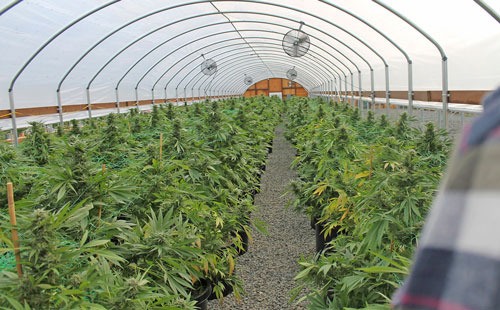Dividing lines began to emerge last week in an increasingly high-stakes tug-of-war over the cultivation of marijuana and whether San Juan County should apply the brakes on future permits to allow for stricter rules to be crafted and imposed on its production.
With a would-be moratorium lingering on the horizon, arguments for and against putting a freeze on permits for large-scale grow operations ricocheted around the room at a Nov. 25 town hall hosted by Friday Harbor Grange No. 966. The meeting drew a standing-room-only crowd.
The chasm that separates opponents and supporters of the moratorium may be deep and wide, but it seems that on one thing everyone could agree: the County Council is to blame for the predicament.
“It seems like we’re punishing farmers for the council not doing their job,” a member of the audience said at the conclusion of the meeting, a sentiment shared by many in the room.
And, by San Juan Island’s Brent Snow, in particular. The forum’s featured pro-moratorium speaker, Snow faulted the county for its failure to implement “reasonable regulations” that protect against the impact of large and big-ticket grow operations that bear more resemblance to a feedlot or slaughterhouse than they do to typical agricultural production.
Three marijuana facilities have been approved and licensed for production in San Juan County by the state Liquor Control Board.
Rather than treating grow operations like any other agricultural activity by default, Snow, who noted that he voted for Initiative 502 and favors a local marijuana industry, believes a moratorium would create the sense of urgency that the county may need to create rules that help shield neighbors from the impacts—like noise, traffic and grow lights—of grow operations.
“San Juan County can’t seem to get it done any other way,” he said.
Following voter-approval in 2012 of I-502, which legalized recreational use of marijuana by adults and tasked the Liquor Control Board with developing a business licensing regimen, cities and counties had authority to develop their own set of zoning and land-use rules in anticipation of marijuana production, processing and retail facilities. San Juan County, where I-502 passed by the state’s largest margin, 68 percent, the county council opted to treat marijuana grow operations as an agricultural activity, which are governed by the same rules that would apply to cultivation of tomatoes.
As part of the Liquor Board licensing regimen, a marijuana grow operation is required to in place and operating in order for an inspection of its requirements to take place before a license can be issued. Concerns raised over construction and the impacts of several grow operations on San Juan Island prompted the county council to consider imposing a six-month moratorium on accepting permits for Tier 2 or Tier 3 operations while new regulations targeting such facilities would presumably be created.
San Juan County is no stranger to moratoriums on construction or land-use. Such measures have put in to prevent construction of guesthouses, and on land divisions in San Juan Valley and in Deer Harbor in recent history. All three were reenacted after the initial moratorium expired and each lasted well over six months.
The council will host a pair of workshop related to marijuana cultivation and the would-be moratorium Jan. 12 and Jan. 26, beginning at 9:15 a.m. Both dates are on a Monday. In order to implement a moratorium, the council would need to determine that an emergency to the well-being of county residents exists without it.
Speaking on behalf of the Committee for Diversified Agriculture and against the moratorium, Sandy Strehlou said a moratorium is unnecessary, unfair, unprecedented and the “wrong tool” to wield even if new regulations on marijuana production is warranted. She noted the moratorium is opposed by the county Agricultural Resources Committee and that new rules should be consider as a comprehensive review of county regulations.
In addition, Strehlou said the council has been pushed toward a moratorium by objections on only a few property owners and that the amount of land where marijuana is under cultivation totals only four acres countywide.
“Four acres cannot possibly constitute a crisis,” she said. “What’s true for vegetables should be true for cannabis.”




